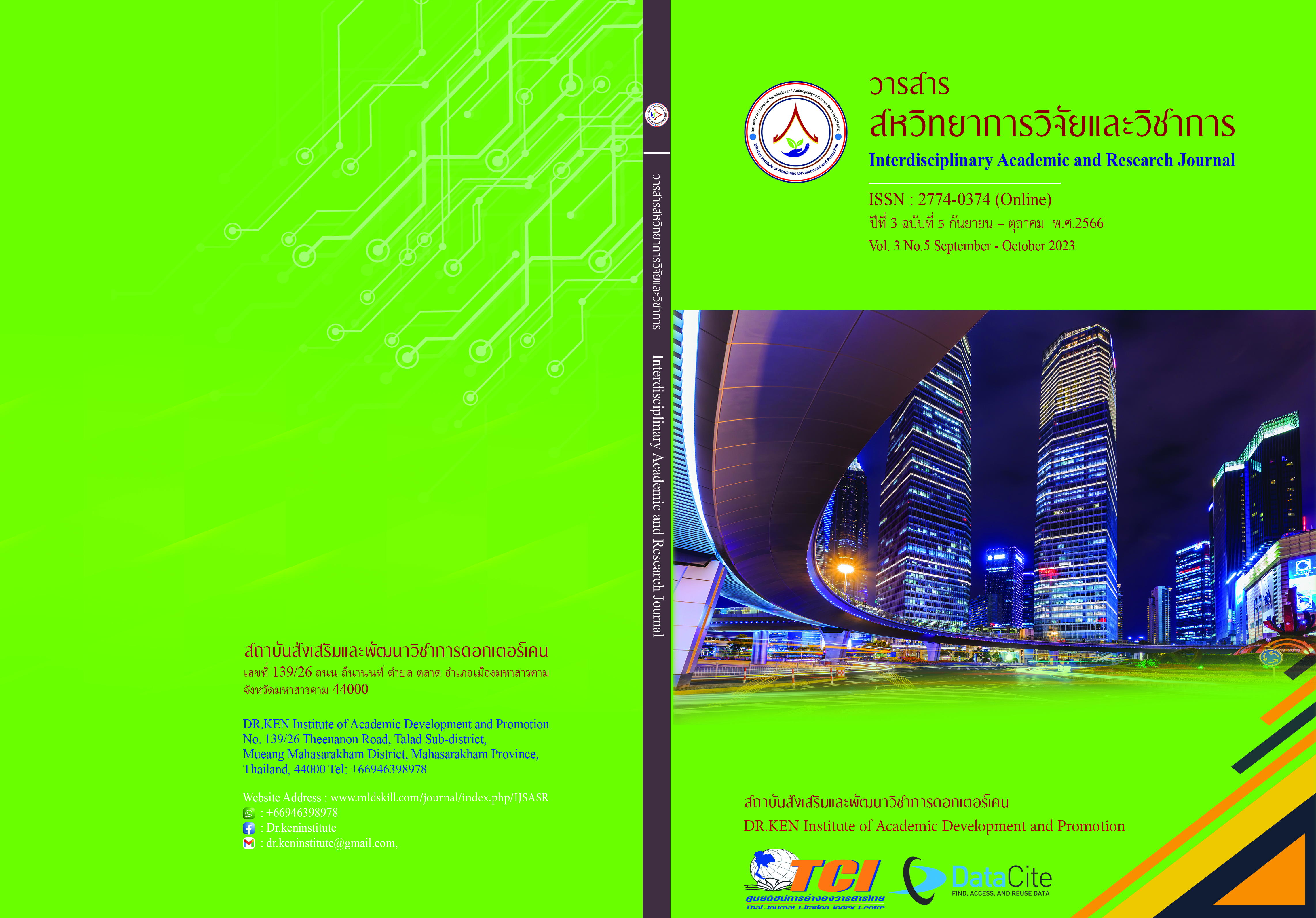Micro-Learning Management on the Transmission Genetics to Enhance Motivation of Grade 10 Students
DOI:
https://doi.org/10.14456/iarj.2023.250Keywords:
Micro-Learning; , Learning Achievement; , MotivationAbstract
Changes in social, economic, environmental, and political conditions in the 21st century are happening rapidly. cause awareness in developing the potential of each country, which the design and arrangement of Learning that is right for students in the 21st century is critical. Therefore, this research has an objective; (1) to develop a microlearning lesson plan on Transmission Genetics for grade 10 students, (2) to compare learning achievements on Transmission Genetics of grade 10 students before and after the microlearning, and (3) study of motivation on Transmission Genetics during the microlearning. The target group of this study was 34 grade 10 students from the Cluster Random Sampling technique. The study was conducted in the second semester of the 2022 academic year for 4 weeks, 3 hours a week, a total of 12 hours. The research instruments included: (1) 6 microlearning lesson plans on Transmission Genetics, a total of 12 hours. (2) the 30 items, four multiple learning achievement tests on Transmission Genetics. The research found that: (1) the microlearning lesson plans on Transmission Genetics for grade 10 students were indicated at the highest appropriate level, and (2) Grade 10 students had learning achievement after the microlearning higher than before the learning at .05 statistically significant level. And (3) Grade 10 students had increased learning motivation steadily during the microlearning.
References
กระทรวงศึกษาธิการ. (2553). หลักสูตรแกนกลางการศึกษาขั้นพื้นฐาน พุทธศักราช 2551. กรุงเทพฯ: โรงพิมพ์คุรุสภาลาดพร้าว.
ขวัญชนก พุทธจันทร์. (2563). การเรียนรู้แบบ Micro-Learning. Retrieved on 20 December 2022, from: https://www.lib.ku.ac.th/2019/index.php/covid-19/1041-microlearning
เขียน วันทนียตระกูล. (2553). แรงจูงใจมีความสำคัญต่อการเรียนการสอนอย่างไร. Retrieved on 20 December 2022, from: http://www.lanna.mbu.ac.th/artilces/Intrinsic_Kh.asp
ชัยศาสตร์ คเชนทร์สุวรรณ. (2563). การพัฒนาผลสัมฤทธิ์ทางการเรียน เรื่อง พันธุกรรม ด้วยไมโครเลิร์นนิง สำหรับนักเรียนระดับชั้นมัธยมศึกษาปีที่ 3. วารสารวิจัยและพัฒนามหาวิทยาลัยราชภัฏสวนสุนันทา, 12(2), 137–147.
ดลฤดี ไชยศิริ. (2563). การส่งเสริมแรงจูงใจใฝ่สัมฤทธิ์ทางการเรียน โดยใช้การเรียนรู้แบบผสมผสานร่วมกับแนวคิดเกมิฟิเคชัน สำหรับนักเรียนชั้นมัธยมศึกษาปีที่ 4 โรงเรียนผดุงนารี. วิทยานิพนธ์ปริญญามหาบัณฑิต: มหาวิทยาลัยราชภัฏมหาสารคาม.
ปิยะพงษ์ ธรรมรักษ์. (2563). การพัฒนาความฉลาดทางดิจิทัลของนักเรียน ระดับชั้นมัธยมศึกษาปีที่ 4 โรงเรียนสกลราชวิทยานุกูล โดยการจัดการเรียนรู้แบบห้องเรียนกลับด้านร่วมกับการเรียนรู้แบบ ไมโครเลิร์นนิ่ง. วิทยานิพนธ์ปริญญามหาบัณฑิต : มหาวิทยาลัยศรีปทุม.
ผกาวัลย์ นามนัย. (2562). การพัฒนาผลสัมฤทธิ์ทางการเรียน เรื่อง กฎหมายและการดำเนินชีวิตและพัฒนาความสามารถในการแก้ปัญหาอย่างมีวิจารณญาณ ชั้นมัธยมศึกษาปีที่ 3 โดยใช้กิจกรรมการเรียนรู้เชิงรุก. วิทยานิพนธ์ปริญญามหาบัณฑิต: มหาวิทยาลัยราชภัฏมหาสารคาม.
โมลี สุทธิโมลิโพธิ. (2563). ลักษณะของบุคคลที่มีแรงจูงใจใฝ่สัมฤทธิ์. วารสารพุทธจิตวิทยา, 5(2), 12-17.
โรงเรียนเตรียมอุดมศึกษาพัฒนาการ ร้อยเอ็ด. (2565). ข้อมูลสถิติจำนวนนักเรียนโรงเรียนเตรียมอุดมศึกษาพัฒนาการ ร้อยเอ็ด อำเภอเมืองร้อยเอ็ด จังหวัดร้อยเอ็ด. ร้อยเอ็ด: โรงเรียนเตรียมอุดมศึกษาพัฒนาการ ร้อยเอ็ด.
สถาบันทดสอบทางการศึกษาแห่งชาติ. (2564). การทดสอบการศึกษาระดับชาติขั้นพื้นฐาน : O-NET. Retrieved on 20 December 2022, from: http://www.newonetresult.niets.or.th/Announcement Web/Notice/FrBasicStat.aspx
อาภรณ์ ภู่วิทยพันธุ์. (2563). ศิลปะการเรียนรู้ด้วยตนเองแบบ Micro Learning. วารสารธรรมนิติ HR Society Magazine, 18(205), 29-33.
Javorcik, T., & Polasek, R. (2019). Comparing the Effectiveness of Microlearning and eLearning Courses in the Education of Future Teachers. 17th International Conference on Emerging eLearning Technologies and Applications (ICETA), Starý Smokovec, Slovakia, 2019, pp. 309-314, doi: 10.1109/ICETA48886.2019.9040034.
Mohammed, G., Wakil, K., & Nawroly, S. (2018). The Effectiveness of Microlearning to Improve Students’ Learning Ability. International Journal of Educational Research Review, 3(3), 32-38.
Singh, N., & Banathia, M. (2019). Micro-Learning: A new dimension to learning. International Journal of Scientific and Technical Advancements, 5(1), 141–144.
Downloads
Published
How to Cite
Issue
Section
License
Copyright (c) 2023 Sutheethida Nilbanphot, Panwilai Dokmai

This work is licensed under a Creative Commons Attribution-NonCommercial-NoDerivatives 4.0 International License.
Copyright on any article in the Interdisciplinary Academic and Research Journal is retained by the author(s) under the under the Creative Commons Attribution-NonCommercial-NoDerivatives 4.0 International License. Permission to use text, content, images, etc. of publication. Any user to read, download, copy, distribute, print, search, or link to the full texts of articles, crawl them for indexing, pass them as data to software, or use them for any other lawful purpose. But do not use it for commercial use or with the intent to benefit any business.
















.png)


